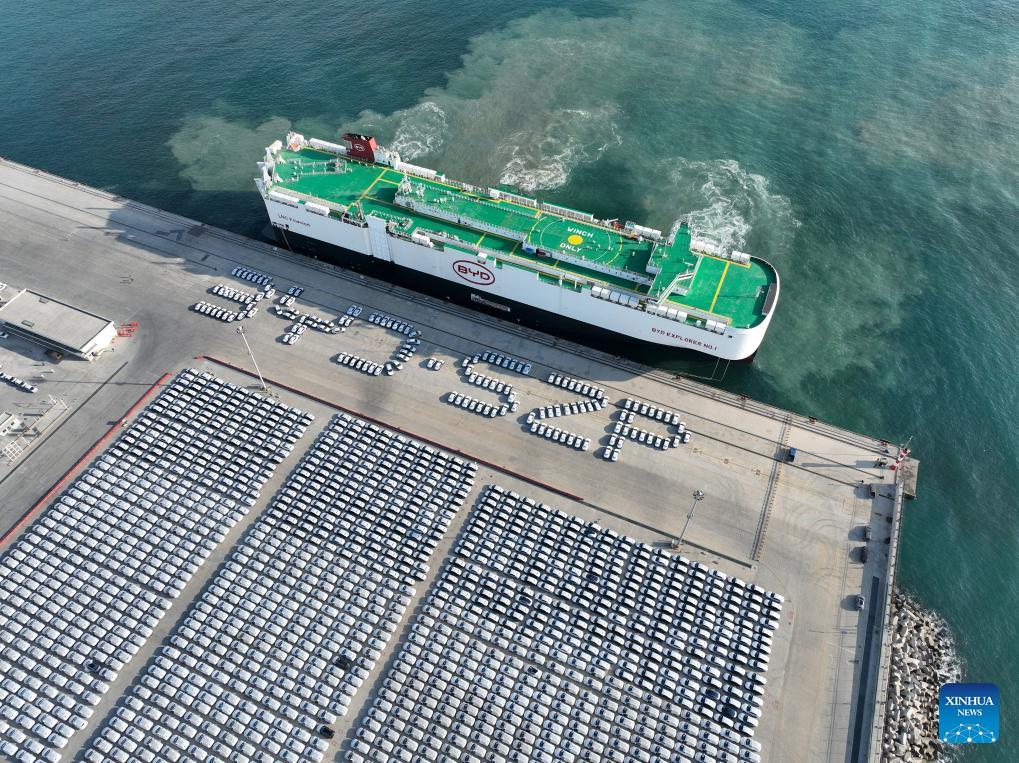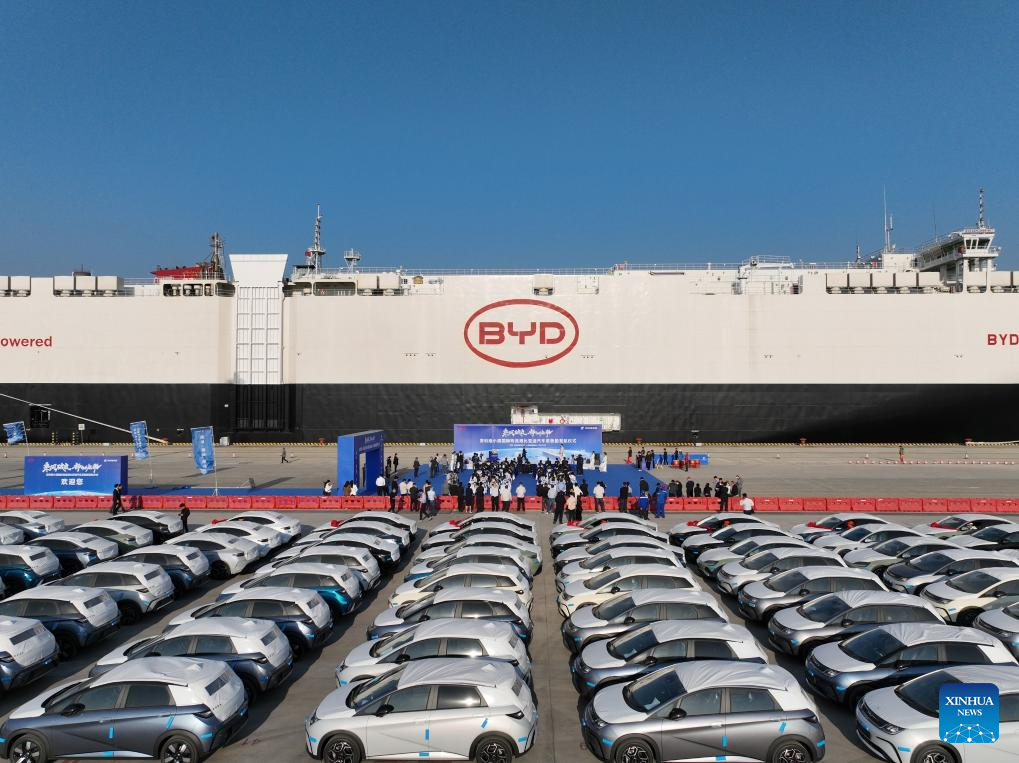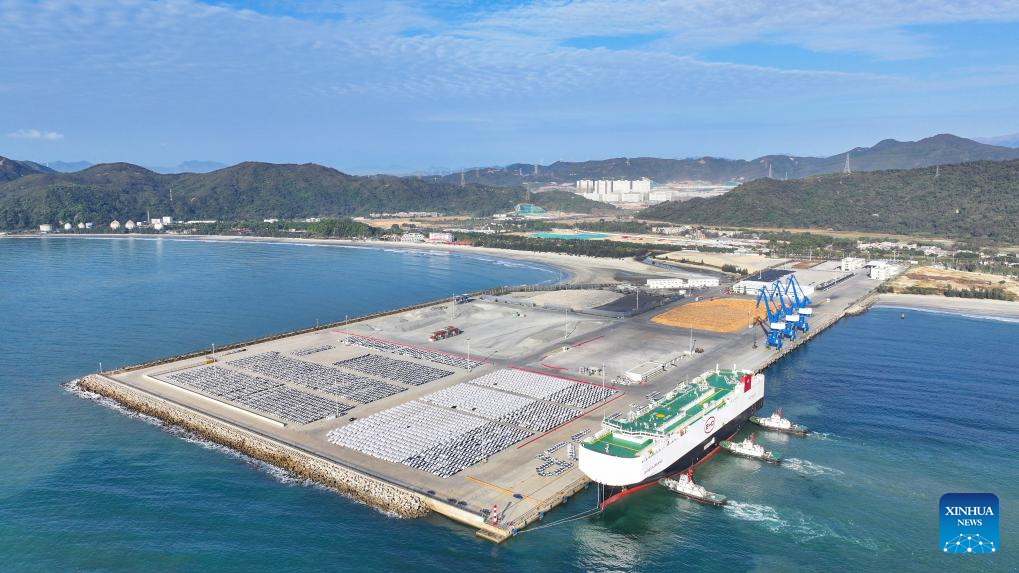Chinese carmakers brace for export boom with own fleets
"BYD EXPLORER NO.1," a vehicle carrier vessel leased to Chinese automaker BYD, held its maiden voyage ceremony on 15th of Jan, at a port in Shenzhen, south China's Guangdong Province.
With more than 5,000 new energy vehicles (NEVs) on board, it will set sail for the ports of Vlissingen in the Netherlands and Bremerhaven in Germany.
It is the first vessel in the shipping fleet of BYD, which has joined a number of Chinese automakers in accelerating car exports by operating their own shipping fleets.
According to China International Marine Containers (Group) Co., Ltd. (CIMC), the vessel was built by CIMC Raffles, a subsidiary of CIMC, for international ship management company Zodiac Maritime, and was leased to BYD.
The vessel was delivered on Tuesday to a construction base in Longkou, east China's Shandong Province, before sailing to Yantai Port to be loaded with the first batch of 1,389 NEVs. On Sunday, the vessel arrived at Shenzhen and was loaded with the second batch of some 4,000 NEVs.
According to China's General Administration of Customs, China's auto exports surged to 5.22 million vehicles in 2023, up 57.4 percent year on year.
As China's automobile industry embraces a new export era, automakers are grappling with challenges such as soaring rents, shipping capacity constraints, and intense competition for available car carriers.
Data from global shipping research institution Clarksons Research shows that from August 2020 to the end of November 2023, the one year time charter rate for a 6,500 Car Equivalent Unit (CEU) pure car and truck carrier (PCTC) had soared from 10,000 U.S. dollars per day to 115,000 dollars per day, an increase of more than 10 times.
To bolster automobile exports, major Chinese automakers, including BYD, Chery, and SAIC, have ventured into establishing their own fleets.
Notably, Guangzhou Shipyard International Company Limited successfully implemented an order for two BYD PCTCs on Jan. 23, 2023, while Chery Group subsequently announced plans to establish its own global shipping fleet. SAIC's Anji Logistics, in the past two years, has also ordered a number of large car carriers exceeding 7,000 vehicles each from the Jiangnan Shipyard.
In recent years, the concentration of the global automobile shipping market has remained high, with automakers in Japan, Republic of Korea (ROK) and other countries having deep ties with the transportation link.
According to data from the research institute of China Merchants Bank, as of November 2021, the global capacity of the top 10 car transport shipping companies -- mainly from Japan, ROK and European countries -- accounted for 59.42 percent of the market share, while the car transport capacity of Japan and ROK is mostly occupied by their domestic car manufacturers.
Previously, China's status as a major auto exporter was limited, resulting in minimal emphasis on building an independent shipping fleet. Currently, China has 39 car carrier vessels with a total of 115,000 CEU, representing only 2.8 percent of the global shipping capacity, according to Clarkson Research.
As China's shipbuilding industry flourishes and automobile exports surge, the trend of Chinese automakers utilizing domestically-built ships for transportation has become more evident.
At present, Chinese shipyards have undertaken the vast majority of new orders for car carriers in the world. For instance, Guangzhou Shipyard International Company Limited are booked solid until 2028.
Upon the delivery of the new ship orders, Chinese shipping fleets will significantly increase its global proportion of car carrier capacity, and are expected to rise to the fourth position, trailing behind Japan, ROK, and Norway.
Industry experts stress that achieving high cost performance is pivotal for Chinese cars' global competitiveness. Through long-term collaborations with car manufacturers, local shipping companies can provide more competitive transportation solutions.
Moreover, establishing shipping fleets also holds strategic significance for Chinese automakers to ensure security and stability of the supply chain.
Xie Xiaowen, an expert with the China Communications and Transportation Association, notes that the acquisition of ships by automakers symbolizes the continuous development and internationalization of China's automobile industry.
"For automakers, buying ships can ensure the stability of the export business, reduce transportation costs, and ensure that products are delivered to overseas customers on time," Xie said.
Chen Jia, a researcher at Renmin University of China, believes that Chinese automakers shipping fleets are poised to break the longstanding monopoly of foreign shipping companies on crucial routes and markets, laying a more solid foundation for the global trajectory of Chinese automakers.

Vehicle carrier vessel "BYD EXPLORER NO.1" arrives at Xiaomo International Logistics Port in Shenzhen, south China's Guangdong Province.

This photo taken on Jan. 15, 2024 shows a maiden voyage ceremony for vehicle carrier vessel "BYD EXPLORER NO.1" held at Xiaomo International Logistics Port in Shenzhen, south China's Guangdong Province.

Vehicle carrier vessel "BYD EXPLORER NO.1" arrives at Xiaomo International Logistics Port in Shenzhen, south China's Guangdong Province.
Xinhua
Other posts by Xinhua
Contact author
blog comments powered by